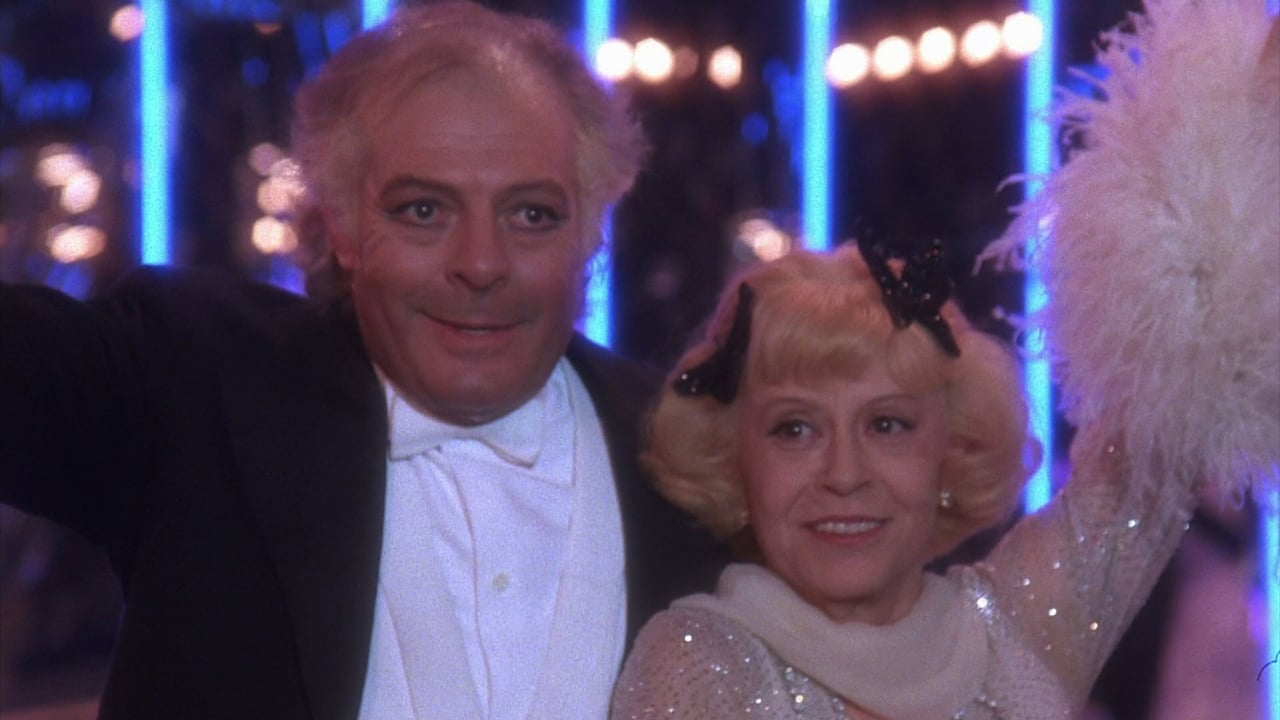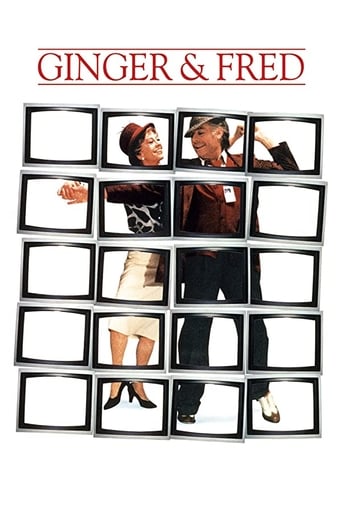

Marcello Mastroianni and Giulietta Masina star in "Ginger and Fred" from 1986, directed by Federico Fellini.Amelia and Pippo once had a successful act imitating Fred and Ginger. Thirty years after their act, they are asked to dance in a special Christmas show for TV called "We Are Proud To Present."It's a real freak show with the most bizarre acts you've ever seen, including a priest who left the priesthood and is now engaged, a man of the cloth who can levitate himself, lookalikes - some very strange acts.Amelia and Pippo not only danced together but were involved. However Amelia married, had a daughter and is now widowed. Pippo married as well.Amelia is worried that Pippo isn't up to the dancing, and when the power goes out in the theater, the two consider bolting.Bittersweet film with marvelous acting and real chemistry between the two.Masina was married to Fellini and died five months after he did.
... View MoreFellini in top form here. I don't know why this gets so much indifference. Along with "And The Ship Sails On," this might be one of Fellini's best films, up there with Juliet and 8 1/2. You should also check out Intervista. A story of two aging performers well past their peak of popularity team up after not seeing each other in decades to dance on a variety show. "Ginger," the lady, doesn't seem to even understand the nature of the show she's appearing and is baffled and disturbed by the circus freaks and transvestites. "Fred," the man, is bitter with age and a bit embarrassed that he doesn't have more to show for his life. He even threatens to derail their appearance to make a statement about what sheep the modern audience is. The stinging commentary on television and rampant commercialization is always in the background, and fortunately it's more of a cultural critique than a political one (I don't think Fellini had a political bone in his body). For me, the emotional core of the film is probably Fred's discussion with a bemused, condescending writer about the origins of tap dancing. I won't spoil it.
... View MoreGinger e Fred (1986) is one of the few movies (4 in all) Fellini made in the '80s,and the ripest fruit of his late career,the acme of his narrative cinema.(In the 7th decade of the 20th century,Fellini also made relatively few films:only 4,and also 2 sketches.)Is "Ginger ..." Fellini's best movie?I don't know that;but it certainly is the one that I cherish most.Exquisite, unobjectionable, unparalleled cinema? Surely!Within the Fellini criteria,this is a rather simple movie,deprived of experiments,etc.;it is,of course,of no avail to be "told",but not because it lacks a "story",only that it is a simple,uneventful one.A sudden return to what we may call a perennial realism,of a perfect incision and a welcome sobriety of means,a huge appetite for giving an objective and transitive creation (though the resources of grotesque,tenderness,comic,Oneiric ,a detached Inebriety,satire,effects of strange,caricatures,etc.,are also used).It is also a return to a narrative form,and a very comic movie:in this film,Fellini has a content to be told,to be molded and put in an epic shape.The weird people could not miss,on the contrary;but the movie has an obvious realistic aim,in a comical,satirical and tender key.As shape,it is not an essay,but a realist narration,and each thing,though caricatured,is plausible.I would say that Fellini has,in "Ginger ...",so firm a notion on what he wants to say,that he can afford himself to be playful.He can afford it,as the main aim of his movie is so firmly handled.He had some things to say about love,life,old age,career,art,TV,contemporary life,etc.,some very straight things.For this movie,he chosen to deepen in the contemporary world;moreover,here he has not anymore that sense of tearing,of speechless pained,exasperated sensibility that gave a very special note to his '50s movies.A shivering,a feverishness.Mrs. Masina,in her room,looking outside:she sees a Martian landscape.Throughout his 50 years career,Fellini made some TV creations (such as The Clowns and A Director's Notebook).In "Ginger ...",he expresses all his disgust for that institution,in a very acid charge.Is Fellini ever "non-judgmental", as some would like to believe?Never.Mastroianni,with his whistles,and licentious jokes,and bad language,and courtesy.Fellini always allowed his actors to be great,to do THEIR creations,he never used them as mere puppets.Must I praise here Mastroianni's perfect mastery of his profession,his exquisite and tasty professionalism,in the noblest sense of this banal word?Fellini was a too generous, too intelligent director,not to let,and not to encourage Mastroianni be himself and give his best.Hence ,Mastroianni's "Pippo" is a whole chapter in the acting's history.(Hitchcock was not content with Clift,and I don't think he was with Newman;Antonioni was not content with Harris.Well,Fellini seemed to like the actors with strong personalities:he had in his movies Mastroianni,Anthony Quinn, Basehart, Broderick Crawford,Sordi,Terence Stamp,Anouk Aimée,François Périer, etc.,etc.!He never disliked or avoided to work with the great actors;this is a sign of his abundant and good-humored endowment,able to engross others' aptitude for creation .With Fellini,the actor's dignity is safe,and restored,the actor is allowed to display his endowment and work,his creation is sustained by the director.)In "Ginger ...",as in some other shows he did as an oldster,Mastroianni finds that exactness,that roundness,that plenitude,that sureness,that pleasantness,that made him maybe the most sure-footed actor.In his youth and maturity,Mastroianni's force came from his dexterity,intrepidity,etc.;now,there is this sheer artistic robustness.Watch Mastroianni and Mrs. Masina,to see for yourself how far,how deep the actors' art can go.
... View MoreMemories are time capsules kept within every one of us, stored in the mind, but activated by the heart; the indelible images and sensations that make up an individual's life. A heartbeat away, they can be opened at any time, but let the bearer beware, for often they are bittersweet at best. `Ginger and Fred,' directed by Federico Fellini, and starring Giulietta Masina and Marcello Mastroianni, brings two people back together after nearly thirty years apart, a reunion of the professional dance team who for fifteen years prior to their retirement imitated Ginger Rogers and Fred Astaire to the delight of audiences all over Europe. Now, all these years later, they are to dance together again; this time on the popular television show, `We Are Proud To Present,' a `tabloid' type show which presents a variety of acts and guests weekly for the perusal of their curious audience. And so, amid a circus atmosphere of acts comprised of a troop of midgets, an Admiral, a number of celebrity impersonators and those whose personal lives have attracted media attention, Amelia Bonetti/'Ginger' (Masina) and Pippo Botticella/'Fred' (Mastroianni), come together again for one magical night during which they hope to recapture that spark of life they had embraced those many years ago. At it's core, Fellini's film is heart-felt and poignant. On one hand, it's a satire of popular television; on the other, it's an examination of the very real ramifications of those so-called `sentimental journeys' that those of a certain age are wont to take, and during which it is often discovered that it is, indeed, impossible to go home again. What really makes this film work is the stoic attitudes of the principal characters, especially Ginger, who though she is happy to see Pippo again refuses to allow sentiment to engulf her. Obviously, her memories are fond ones, but she manages to stay in the here and now, taking life as it is and not merely basking in what it was. Pippo, though, has a bit more of the wanton dreamer in him, possibly due to the fact that his life since the split with Amelia has not been as directionally grounded as that of his former partner. But as showtime approaches, they manage to strike a balance between the past and now that keeps them on track and holds much promise for an evening of making new memories to add to the old. Besides the story itself, what makes this film a real treasure is the presence and performance of the indomitable Giulietta Masina. In her mid-sixties when this was filmed, she still had `it' in spades. All the moves, the attitude, the coquettishness that made her one of the most expressive actresses ever. Even in her advancing years she was still an absolute joy to behold. There was something so down-to-earth, yet almost mystical about her, that gave her that rare quality of being `real' in every role she played. Extremely talented and charismatic, she was quite simply an extraordinary actress. Somehow-- and it's quite puzzling-- she never achieved the international stardom nor received the acclaim she deserved. This film proved to be her theatrical swan song, and simply put, what a way to go. She bowed out as she had always lived her life and performed-- with style, grace and more than a touch of class. Her `Ginger' is a truly memorable character. Not to be outdone by his diminutive co-star, Mastroianni gives a wonderful performance as well, capturing the essence of a man whose life has apparently been in one continuous state of flux. As the story unfolds, you get the feeling that his aloofness merely masks a somewhat undisciplined determination, probably more often than not derailed by the boy still residing in the man. Most importantly, though, he makes Pippo entirely believable, and the fact that he is so good in this film reflects, I believe, not only upon his ability as an actor, but upon the fact that Masina was so giving as an actress. It is apparent in the way they play so well off of one another, and the real chemistry between them is unmistakable. The supporting cast includes Frederick Ledebur (Admiral), Friedrich von Thun (Industrieller), Francesco Casale (Mafioso) and France Fabrizi (Show Host). One of Fellini's tenderest films, `Ginger and Fred' is something of a reflection upon life and love; watching it is like reminiscing with, or about, an old friend or loved one. The film has something of a dream-like quality about it that is so in keeping with Fellini's visionary style, and by the end you will find that you have been absolutely transported. Still, of all the wondrous images brought to the screen by Fellini during the many years of his career, the greatest of all was irrefutably Giulietta Masina. I rate this one 10/10.
... View More